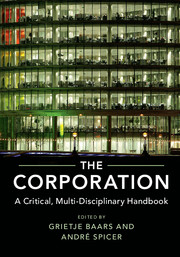Book contents
- Frontmatter
- Contents
- List of Contributors
- Acknowledgements
- Introduction: Why the Corporation?
- PART I DISCIPLINARY OVERVIEWS
- 1 The Corporation in History
- 2 The Corporation in Legal Studies
- 3 The Corporation in Economics
- 4 The Corporation in Sociology
- 5 The Corporation in Anthropology
- 6 The Corporation in Political Science
- 7 The Corporation in Geography
- 8 The Corporation in Accounting
- 9 The Corporation in Management Studies
- PART II INTERDISCIPLINARY THEMATIC CHAPTERS
- 1 The Evolution of the Corporate Form
- 2 The Multinational Corporate Group
- 3 The Financialization of the Corporation
- 4 Corporate Value Chains
- 5 Corporate Citizenship
- 6 The Corporation and Crime
- 7 The Corporation and Ideology
- 8 Corporation and Communities
- 9 Corporations and Resistance
- 10 Alternatives to the Corporation
- Index
- References
1 - The Corporation in History
from PART I - DISCIPLINARY OVERVIEWS
Published online by Cambridge University Press: 31 March 2017
- Frontmatter
- Contents
- List of Contributors
- Acknowledgements
- Introduction: Why the Corporation?
- PART I DISCIPLINARY OVERVIEWS
- 1 The Corporation in History
- 2 The Corporation in Legal Studies
- 3 The Corporation in Economics
- 4 The Corporation in Sociology
- 5 The Corporation in Anthropology
- 6 The Corporation in Political Science
- 7 The Corporation in Geography
- 8 The Corporation in Accounting
- 9 The Corporation in Management Studies
- PART II INTERDISCIPLINARY THEMATIC CHAPTERS
- 1 The Evolution of the Corporate Form
- 2 The Multinational Corporate Group
- 3 The Financialization of the Corporation
- 4 Corporate Value Chains
- 5 Corporate Citizenship
- 6 The Corporation and Crime
- 7 The Corporation and Ideology
- 8 Corporation and Communities
- 9 Corporations and Resistance
- 10 Alternatives to the Corporation
- Index
- References
Summary
The corporation has an extremely long and complex history in Euro-Atlantic law and politics. Its story spreads from the Roman Empire through medieval Christendom to the expansion of early-modern and modern European empires and the so-called industrial, consumer, and financial revolutions. Moreover, notions of how to define a corporation, why it exists, and – perhaps most notoriously – what rights it does and should possess reflect and even sometimes produce broader cultural, political, social, legal, economic, and ideological contexts. Thus, the degree to which thinkers have or have not treated the ‘corporation question’ as an historical one has deeply informed the sorts of answers they have found on some of the most significant controversies over the twenty-first century global corporation: the nature of corporate personhood; the moral and legal obligations and liabilities of the corporation; the relationship between the corporation and other sources of political and economic power, particularly the nation-state; and more.
Envisioning the history and historiography of the corporation as fundamentally intertwined projects, this chapter sets out to offer an overview of the development of the Anglo-American corporation within the context of the world that developed alongside it. In so doing, however, the chapter pays particular attention to the ways in which, at each of these stages of development, conceptions or debates over the corporation's history itself have informed and determined its standing at law and among the public. The chapter begins by examining the ways in which ancient, medieval, and early-modern commentators, for whom history was inseparable from politics, law, religion, and various other enterprises, understood the corporation and its role in society. From there, it traces the ways in which the corporation was transformed in the nineteenth century, both in theory and practice; here too, one can see a direct relationship between the changing nature of the corporation and the way its history was told and retold, particularly as its nature was redefined from a public to a private body at law.
- Type
- Chapter
- Information
- The CorporationA Critical, Multi-Disciplinary Handbook, pp. 21 - 46Publisher: Cambridge University PressPrint publication year: 2017
References
- 4
- Cited by



